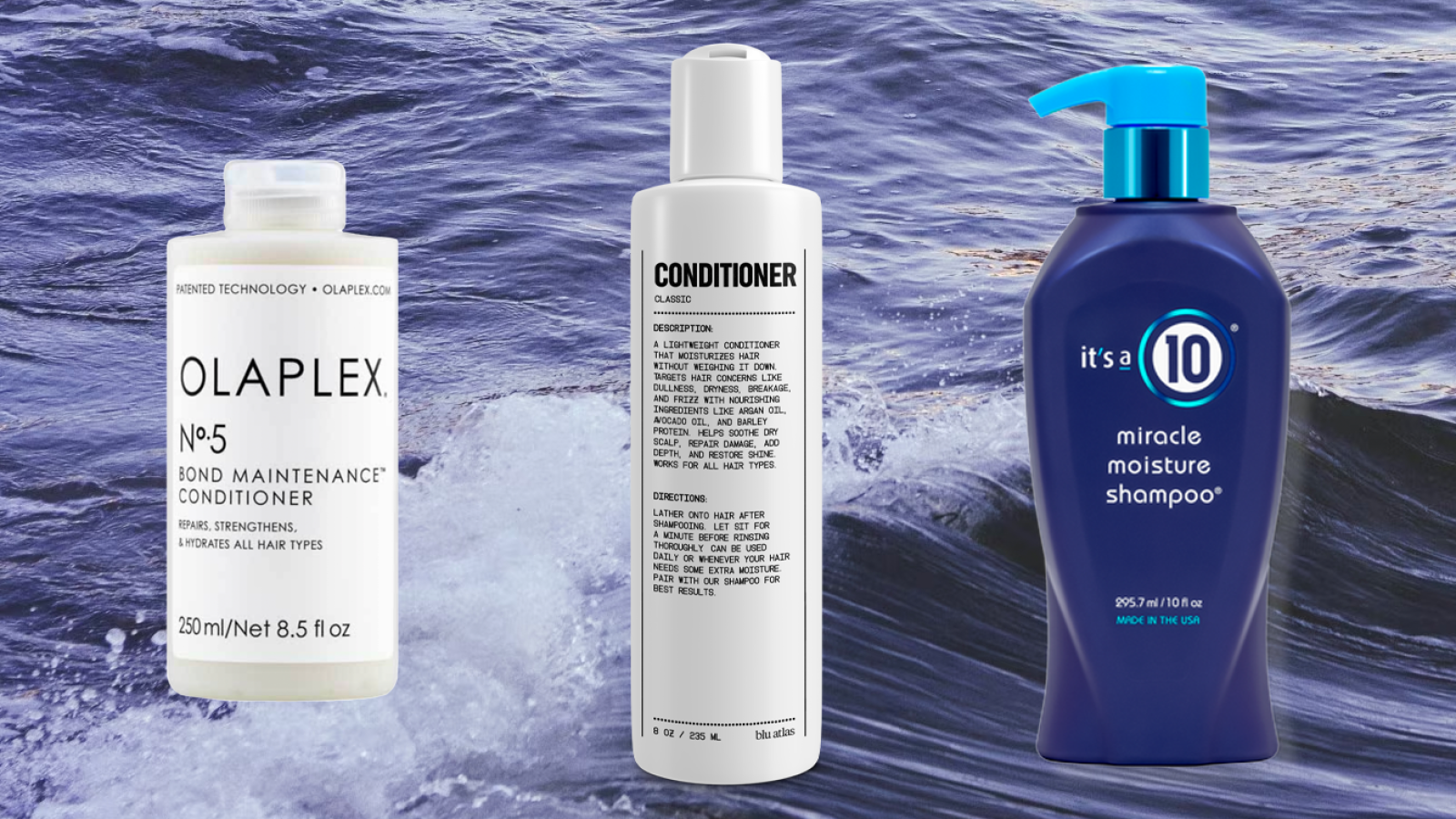Branded content. Us Weekly has affiliate partnerships so we may receive compensation for some links to products and services. Learn more!
Dry hair can really do a number on your self-confidence. No matter how hard you try to style it, you can’t hide severely damaged and dry hair.
Fortunately, with the right haircare routine, you can nurse your hair back to health. Moisturizing shampoos and conditioners can hydrate the cuticle of each hair and seal in moisture, giving you soft, supple strands with a healthy shine. Here are some of the best moisturizing shampoos and conditioners to consider.
1. Blu Atlas Conditioner
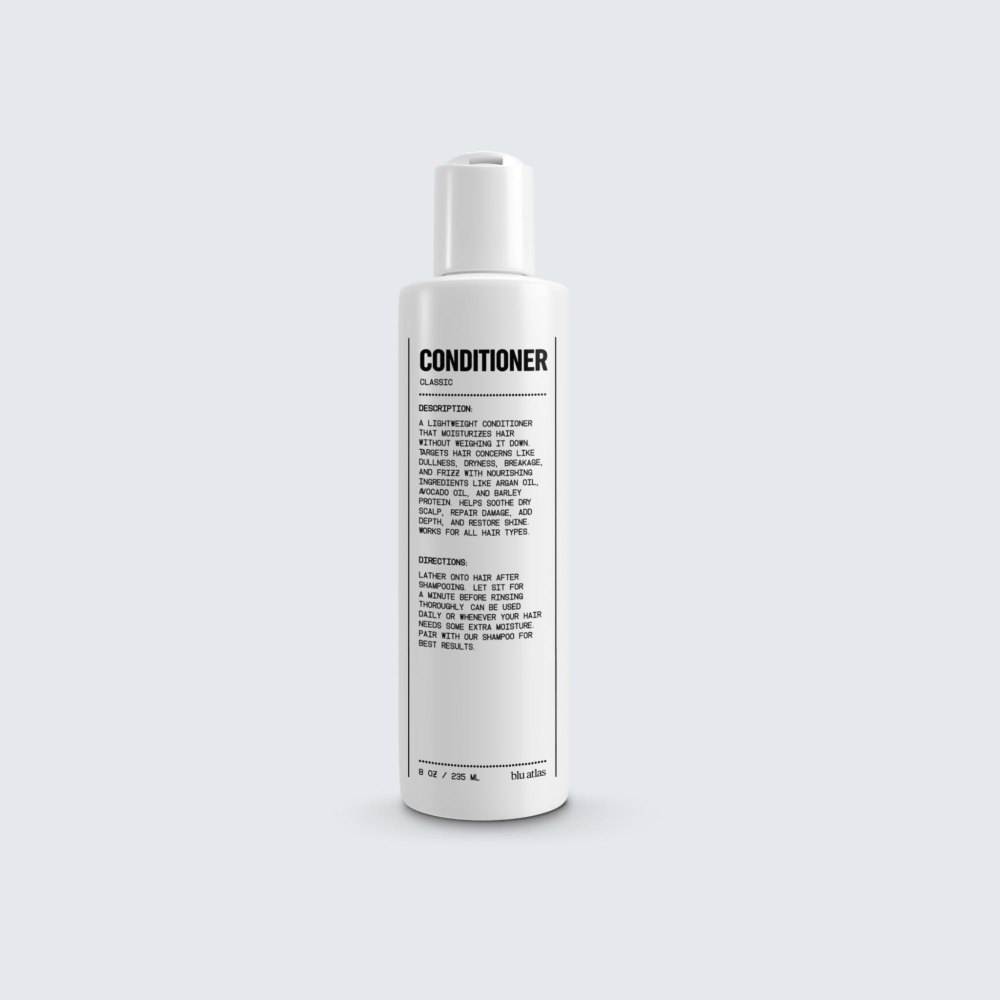
Blu Atlas might be new on the haircare scene, but it’s already made a splash with this moisturizing conditioner. Argan oil, white tea extract, and barley protein work together to add moisture to dull, dry hair without weighing it down.
Argan oil is among the most popular (and proven) hair repair oils. It’s rich in fatty acids and nourishing vitamin E, and it’s unparalleled when it comes to smoothing frizz. White tea brings powerful antioxidant properties to the table and barley protein adds extra strength to repair damage and promote hair health. We also love that it’s free of sulfates, phthalates, and parabens.
2. Olaplex No. 5 Bond Maintenance Conditioner
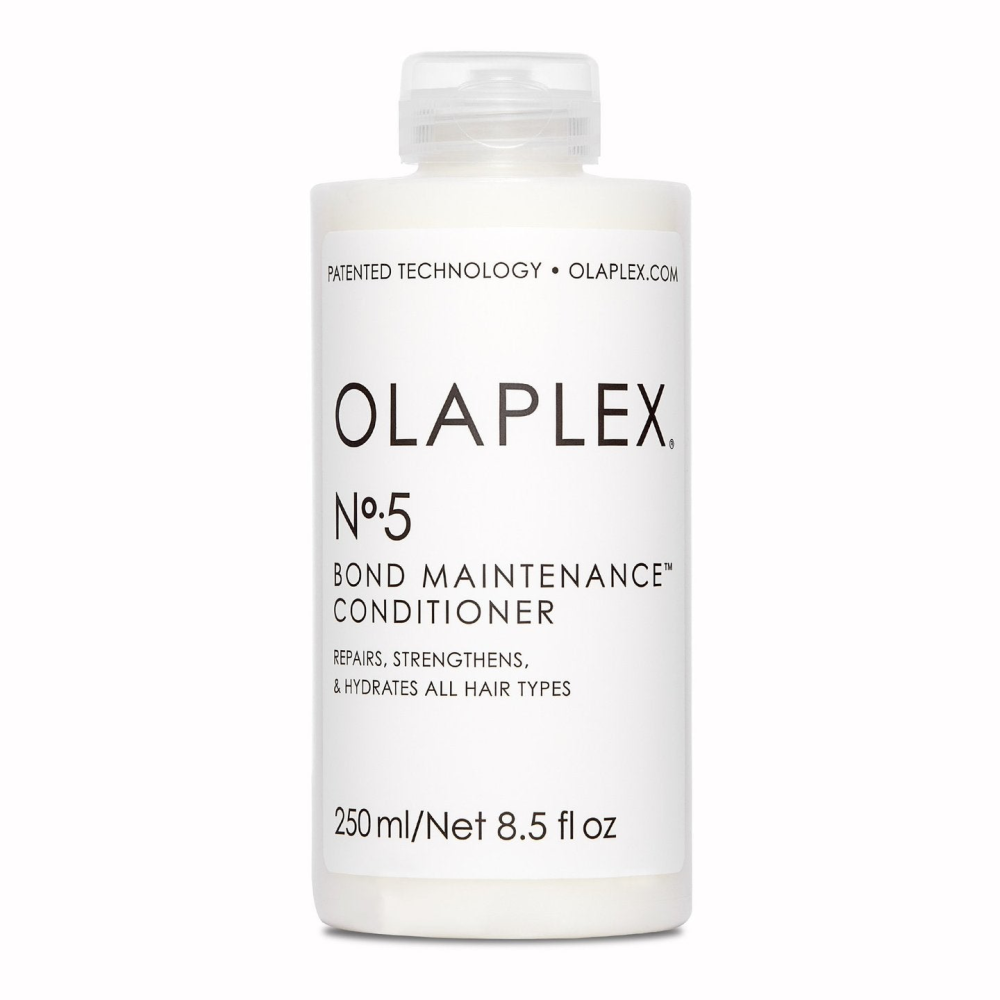
Olaplex is a quality haircare brand that makes shampoos, conditioners, and other products for all types of hair. Plenty of other haircare companies do that too, but Olaplex has a standout ingredient that sets it apart—bis-aminopropyl diglycol dimaleate. This is a specialized molecule that repairs the disulfide bonds between your hairs.
That might sound relatively inconsequential, but these disulfide bonds are what give your hair its shape. They’re especially important for curly and wavy hair types. This specialized molecule is joined by avocado, grapeseed oil, sunflower seed oil and soybean oil to deliver deep, long-lasting moisture.
3. It’s a 10 Miracle Moisture Shampoo
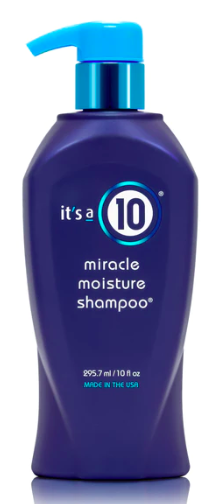
You don’t have to spring for luxury shampoo to get incredible moisture! It’s a 10 offers a shampoo and conditioner that moisturize and soften your hair while soothing your scalp. The shampoo includes sunflower seed extract, an especially light oil that adds moisture without weighing your hair down. Acai berry extract strengthens hair strands, pomegranate delivers nourishing antioxidants, and ginger quiets down an irritated scalp.
The shampoo also includes aloe vera, among the best moisturizers for hair there is. Aloe vera delivers maximum hydration while also bathing your hair in the vitamins it needs for better health. It’s a 10 claims you’ll notice that your hair is softer, stronger, and shinier after just one wash. Try it and find out!
4. Kerastase Resistance Bain Force Architecte Shampoo
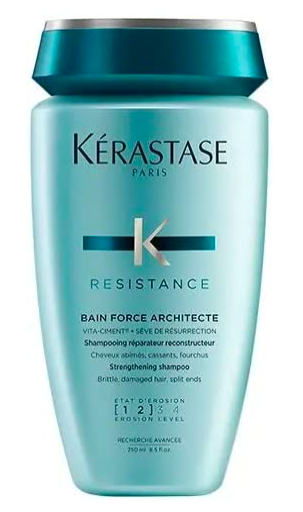
Luxury haircare brand Kerastase makes shampoos for a wide variety of hair concerns. Bain Force Architecte is designed for weak, dull, and damaged hair. One of its central ingredients is the trademarked Vita-Ciment, a mix that contains a protein that works very similarly to keratin to rebuild and strengthen your hair. It’s also a ceramide that helps to restructure each hair fiber from the inside out.
This product also contains a compound Kerastase calls Sève de Resurrection, which is the extract of a flower called Myrothamnus flabellifolius. This plant, also called the “resurrection plant,” can rehydrate and stabilize even severely dry hair.
5. Pureology Hydrate Conditioner
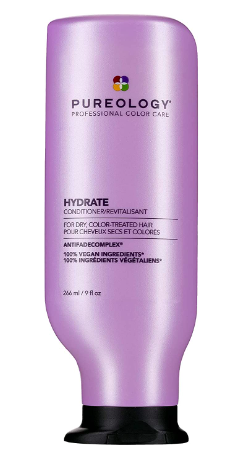
Many of the shampoos and conditioners we’ve mentioned thus far have been good for all hair types. However, Hydrate is a little more specialized. While you probably could use it on any type of hair without ill effect, this shampoo was designed especially for medium to thick hair. It’s ideal for hair that’s dry, color-treated, or both.
We like that this conditioner offers you an aromatherapy-like experience while delivering natural and effective ingredients. Jojoba oil, a natural oil that feels and behaves much like natural skin oil, moisturizes strands from root to tip. Hydrate also has a Menthol & Mint scent that enlivens your senses, leaving you feeling refreshed.
6. VERB Hydrating Shampoo
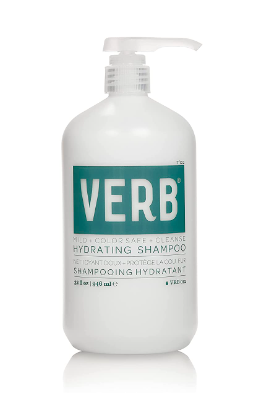
This shampoo from VERB aims to both soften and repair your hair, so it’s perfect if you struggle with dryness and damage. It’s powered by two highly effective ingredients: argan oil and pro-vitamin B5. Pro-vitamin B5 is a real jack of all trades when it comes to haircare. It rehydrates your hair with ease while increasing hair strength and reducing your risk of breakage.
We like that this shampoo can also help protect your hair from further damage and dryness. It delivers natural UV protection, so it’s almost like sunscreen for your hair!
7. SheaMoisture Daily Hydration Conditioner
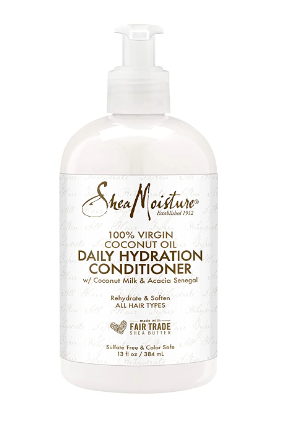
You might recognize this brand, especially if you have curly or textured hair. SheaMoisture makes some of the best moisturizing shampoos and conditioners out there. That’s thanks to its use of shea butter and shea oil, both of which moisturize your hair and then seal that moisture into each strand.
True to form, Daily Hydration Conditioner includes shea oil, but it also brings in another hydrating heavy-hitter: virgin coconut oil. After you rinse the conditioner out, your hair feels instantly softer and detangled. For the best hydration possible, use this product with SheaMoisture Daily Hydration Shampoo.
8. Theorie Amber Rose Hydrating Conditioner
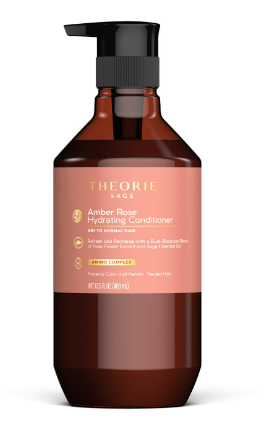
Fragrance might not be the most important thing to consider when you’re selecting a shampoo or conditioner. But a great fragrance can take a simple shower and elevate it to a spa-like experience. If you appreciate a nuanced, complex scent, you’ll love this hydrating conditioner from Theorie. It’s reminiscent of a high-end floral perfume thanks to its notes of amber, jasmine, lily, and rose.
Its star ingredient is the Theorie Amino Complex. Amino acids are precursors to proteins, and they’re essential for rebuilding damaged hair strands. As your hair becomes stronger, you’ll notice it becoming more hydrated, softer, and shinier. Sage essential oil helps protect your hair against free radical damage, too. This conditioner is safe for hair that’s been treated with color or keratin. It can even help restore strands that have been badly damaged by bleach!
9. Biolage Ultra Hydra Source Conditioning Balm
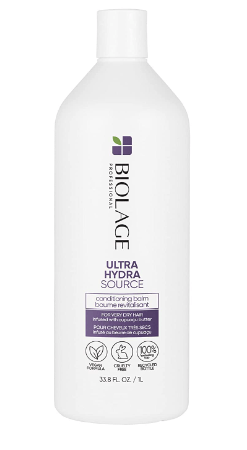
Next-level dry hair requires a next-level solution, and Biolage Ultra Hydra Source is exactly that. Like other Biolage products, this one relies on natural ingredients to nourish and support your hair’s health. Its main ingredients are aloe leaf juice, cupuacu butter, and apricot kernel.
Cupuacu butter comes from a tree related to the cacao tree. It’s an incredibly rich butter that retains moisture, fights free-radical damage, and balances out the lipids naturally found in your hair. Apricot kernel promotes both hair growth and strength. To really give your hair some extra moisture, use it alongside its matching shampoo.
10. Nexxus Humectress Ultimate Moisture Conditioner
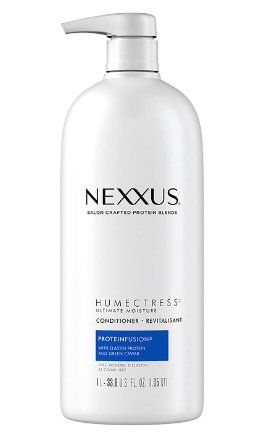
Some hair types tend to lose moisture quickly even when they’ve been recently rehydrated. If you find your hair constantly drying out, Humectress might be the solution you need. This super-moisturizer uses a unique blend of caviar and elastin proteins to do the job.
The amino acids and proteins in caviar are great for strengthening your hair and locking in hydration. Nexxus claims that when you use Humectress Ultimate Moisture Conditioner along with its coordinating shampoo, you can experience 24-hour moisture for smooth, soft, and shiny hair.
Frequently Asked Questions
How do I know if I need a moisturizing shampoo or conditioner?
Moisturizing shampoo can be a godsend for dry hair. But if your hair has sufficient moisture on its own, moisturizing shampoo and conditioner can make it too hydrated and add extra weight.
If your hair feels dry and brittle, it can probably benefit from moisturizing shampoo. Similarly, if it’s dull or lacks elasticity (“bounce”), moisturizing products might be right for you.
Should I get a moisturizing shampoo or conditioner with protein?
That depends on what your hair needs. Dry hair is certainly more prone to damage, but if you don’t notice your hair shedding excessively or breaking, your hair may do well with a moisturizing product.
Protein can help rebuild damaged strands of hair, so it’s a good choice if you do notice a lot of breakage and similar issues. Many protein shampoos are also moisturizing, so if you want the best of both worlds, you might want to look for a shampoo or conditioner that does both.
Is a moisturizing shampoo or conditioner the same as a hydrating one?
These terms are often used interchangeably, even by haircare manufacturers. However, they mean slightly different things. Hydrating your hair involves replenishing the hydration in the center of each strand, and most hydrating products help each hair absorb and retain water. On the other hand, moisturizing products primarily work on the outside of each hair shaft, acting as a seal to keep that moisture in.
Dry hair tends to need both moisture and hydration, so many shampoos that moisturize (including most on this list) offer both.
How do you use shampoo the right way?
It might seem like the answer to this question is obvious. However, plenty of people don’t know the best way to apply shampoo.
To shampoo, be sure to thoroughly wet your hair before applying. When you’re ready to apply the shampoo itself, don’t put it directly on your hair! If you do this, you’ll be less likely to be able to spread it evenly, and you’ll end up wasting shampoo. Instead, apply a little to your palm and massage it through your hair.
When you use shampoo, you should make sure you coat your hair thoroughly, but pay the most attention to your scalp and roots. This is where you’re most likely to get oil buildup. You can massage the shampoo into your scalp, but don’t do so using your nails — this can introduce extra bacteria and cause irritation.
When you’re done shampooing, make sure you rinse carefully! If you leave shampoo on your hair, you may end up with product buildup that makes your hair look dull and weighed down.
How do you use conditioner the right way?
You likely already know that you usually apply conditioner right after shampooing. But make sure your hair isn’t completely dripping wet before you apply it. If your hair is too wet, the conditioner will just slip off, and it won’t have a chance to penetrate the individual hair shafts and rehydrate your hair.
That doesn’t mean you need to step out of the shower and towel dry before applying conditioner, though! Once you’ve rinsed out your shampoo, just wring out your hair before you put in the conditioner.
The key to applying conditioner correctly is to work it through the mid-lengths of your hair to the ends. Be sure to pay special attention to the ends, as they’re often the driest part. Avoid applying conditioner at the roots and scalp. This can over-condition your hair, leading to greasiness. It also can weigh down your hair at the roots, making any style look flat.
However, if you have a very dry scalp and roots, you may find that your hair does best with conditioner worked through the roots, too. The bottom line is to pay attention to your hair and give it what it needs. If you notice extra dryness by the roots, try adding conditioner there and see if that helps.
Generally, conditioner also needs to be left in longer than shampoo does. This gives it time to sink into the cuticle of your hair, deliver moisture, and seal it in. How long you need to leave it in depends on the specific product. Check the label—most conditioners need to be left in for 2–5 minutes. If your hair is extra dry, you can try leaving it in a bit longer.
Should I use a deep conditioner, too?
Deep conditioner is heavier than your more typical rinse-out conditioner. In order to give it enough time to work, deep conditioner needs to be left on your hair for at least 30 minutes. Haircare experts generally recommend using it about once a week to start. If you notice that your hair is still dry, you can start using it more often.
Deep conditioner is a great choice for hair that’s dry and/or damaged. For hair that isn’t too dry, deep conditioner may be too heavy. This is especially true for people with fine hair.
What about leave-in conditioner?
Regular conditioner that you rinse out (sometimes called “rinse-out conditioner”) can be very helpful when it comes to adding moisture. But when your hair needs an extra boost, leave-in conditioner is an important tool to take advantage of.
Unlike regular types of conditioners and deep conditioners, leave-in conditioners are just left in your hair. These conditioners are great for moisturizing hair that’s extra dry or damaged. Most haircare experts recommend using a leave-in conditioner about once a week.
However, if your hair is curly or textured, it’s more prone to dryness than straight hair is, so it may be better to use a leave-in conditioner more frequently. It may take a little trial and error to find what works for your hair. Start with applying a leave-in conditioner (sometimes called a “hair mask”) twice a week, and then do it more frequently if needed.
How do I tell if a shampoo or conditioner is moisturizing?
Some manufacturers make it easy and label their products as “hydrating” or “moisturizing.” But not all of them do. However, with a quick look at the ingredients, you’ll be able to tell if a given product is moisturizing enough. Here are some moisturizing ingredients to look for:
Aloe vera. If you’ve ever cut open an aloe leaf to see the water inside, you might understand why this plant is such an effective hydrating agent for your hair. However, the benefits don’t stop there. Aloe has antimicrobial and antibacterial properties, so it’s a great cleanser that can get rid of extra grease and product buildup without completely stripping the natural oils from your hair.
Aloe is also rich in vitamins E, C, B12 and A. These vitamins are great for hair repair and for promoting the health of hair follicles. You might be surprised to hear that aloe also includes plenty of amino acids and fatty acids. Amino acids, the building blocks of proteins, can help repair strands of damaged hair. Fatty acids help restore your hair’s natural lipid balance, giving it bounce and shine.
One of the best things about this ingredient is that its moisture goes straight to your hair. Aloe juice can easily penetrate the hair shaft and give you moisture that lasts.
Shea butter. This ingredient comes from the shea nut, a plant found in Africa. It’s a classic ingredient in moisturizing shampoos and conditioners, especially in products for curly and textured hair. These hair types tend to lose moisture very easily, but shea butter’s emollient qualities can seal in moisture after it’s delivered, keeping your hair looking healthy and shiny for longer periods of time.
Like aloe, shea butter is rich in vitamins and fatty acids, both of which are perfect for moisturizing and repairing your hair. As a bonus, it’s a great conditioner for dry and itchy scalps, too. Shea butter melts at approximately the temperature of human skin, so it has no trouble absorbing quickly and completely. That’s why it’s such a common ingredient in lotions.
Word of warning if you have very fine hair, though. Shea butter is fairly heavy, so it can easily weigh down fine hair.
Avocado oil. Even fresh avocados feel rich, smooth, and buttery, so it makes sense that a more concentrated oil can do wonders for dry hair. Avocado oil is rich in vitamins B5, E and A. But perhaps most importantly, it’s a great source of biotin.
You might recognize biotin as a common ingredient in shampoos for hair growth and damage repair. That’s because biotin can improve the keratin structure of each hair. This can increase volume, making your hair look healthier overall.
Avocado oil is also better at penetrating the hair shaft than many other hair oils. Some oils contain saturated fats, others contain monounsaturated fats, and still others contain polyunsaturated fats. Saturated and monounsaturated fats do a better job of penetrating the hair shaft than polyunsaturated fats do, and avocado oil is made up of monounsaturated fats.
Argan oil. Argan oil is a great hydrating agent for hair, and it’s among the most popular. You may have seen it incorporated in shampoos, conditioners, and leave-in treatments. It’s also used on its own as a hair oil.
Argan oil contains three key ingredient types for moisturizing hair: antioxidants, vitamin E, and essential fatty acids. All of these ingredients have a hydrating effect on hair, and they also noticeably soften it. Moreover, argan oil is great for restoring elasticity to your hair, so it regains both bounce and resistance to damage.
Coconut oil. Coconut oil is ubiquitous in hair products, and for good reason—it’s one of the most effective moisturizers out there. This is largely thanks to a component of coconut oil called lauric acid. Lauric acid is easily absorbed by the hair shaft, so it’s an especially effective moisturizer.
Coconut oil also gives your hair a protective barrier. This barrier can both seal in moisture and shield your hair from environmental damage.
It’s also great for soothing itchy, dry scalps. Some research even suggests that it can be useful in treating scalp psoriasis!
Jojoba oil. This natural oil works well along with argan oil, moringa oil, and other moisturizing agents, and it’s often found in moisturizing hair products. However, even though it’s called an “oil,” it’s technically a wax, much like the sebum naturally produced by your skin.
It’s important to note that unlike coconut oil and some other hair moisturizing oils, jojoba oil doesn’t penetrate into the hair shaft. Instead, it forms an especially effective seal to keep the moisture in. If you want maximum moisture, look for a shampoo or conditioner that includes jojoba oil along with other moisturizing agents.
Sunflower oil. This oil isn’t quite as common as some other oils in haircare products. However, it’s an effective moisturizer that’s present in budget-minded and high-end hair products alike.
There’s not a whole lot of research on the benefits of sunflower oil for hair. We do know it contains a significant amount of oleic acid. This acid reduces water loss in your hair strands, which makes it an ideal ingredient if you want your hair to retain moisture for longer periods of time.
Sunflower oil also seems to be very good at controlling hair breakage. When you use it regularly, your hair may look longer because the ends aren’t breaking off as often.
Grapeseed oil. Grapeseed oil doesn’t get as much hype as argan oil, coconut oil, or shea butter, but that doesn’t mean it’s not great for your hair! Interestingly enough, grapeseed oil is actually a byproduct of winemaking. The seeds are removed from the grapes and pressed to make an oil.
It’s an especially versatile oil as it can both penetrate the hair strand and seal in moisture. Monounsaturated lipids in the oil reach deep into the hair strands as linoleic acid coats each strand to seal that moisture in.
Why do some hair types need more moisture than others?
Anyone can have dry hair, but certain types of hair are more prone to dryness and breakage. Curly and textured hair types tend to be drier than straight hair. That’s largely because of the distribution of oil from the scalp. If your hair is straight, the scalp oil can easily extend down the hair shaft. But with curly and textured strands, it’s harder for the oil to make its way down. Moisturizing haircare products can make up for the lack of oil and keep your hair looking healthy.
More porous hair types also require more moisture and hydration as they tend to lose water quickly. You can’t really tell if your hair is porous just by looking at it, but there’s a test you can do. Take a single loose strand and place it in a glass of water. If the hair is porous, it will absorb water and sink quickly. Hair that’s not porous will float.
What else can I do for dry hair?
It often takes time for even the best moisturizing shampoos and conditioners to fully restore your hair. But if you want to keep your hair especially healthy, there are a few other things you can do.
Among the most important things is to not wash your hair every single day. This can dry it out, and dry hair typically doesn’t need to be washed daily. Instead, try washing your hair every other day or a few times per week.
When styling your hair, you can also use a small amount of a natural hair oil (like argan oil) to tame frizz and add shine. As a bonus, the hair oil will further condition your hair. Be sure to avoid hair products with alcohol as these can dry out your hair even further.
It’s also important to make sure you eat a balanced diet and take a multivitamin or supplement as necessary. If you’re running low on critical nutrients, it can affect your hair health more than you think!
Not done shopping? See more of our favorite products below:
- 26 Best Face Moisturizers for Combination Skin
- 15 Best Face Moisturizers in 2023
- 14 Best Nourishing Night Eye Creams to Use in 2023
Members of the editorial and news staff of Us Weekly were not involved in the creation of this content.
